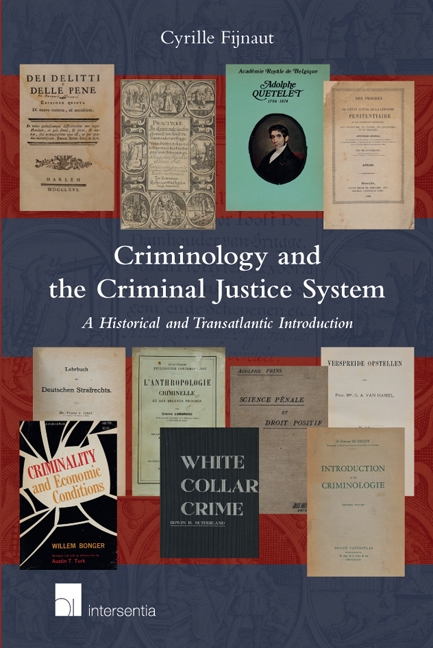Book contents
- Frontmatter
- Preface
- Contents
- Chapter 1 General Introduction
- Chapter 2 Origin of the Present-Day Criminal Justice System
- Chapter 3 Restructuring of the Criminal Justice System During the Enlightenment and the French Period
- Chapter 4 Emergence of the Scientific Study of Crime, Criminals, and the Combatting of Crime
- Chapter 5 Establishment of Criminology in Italy and France
- Chapter 6 Development of Criminology in German-Speaking Europe and the United Kingdom
- Chapter 7 Establishment of Criminology in the Netherlands and Belgium
- Chapter 8 Ideologisation of Criminology in the Third Reich and the Soviet Union
- Chapter 9 Reception of European Criminology in the United States
- Chapter 10 Transatlantic Integration of Criminology
- Chapter 11 General Conclusion
- Bibliography
- Register of Names
Chapter 3 - Restructuring of the Criminal Justice System During the Enlightenment and the French Period
Published online by Cambridge University Press: 11 October 2018
- Frontmatter
- Preface
- Contents
- Chapter 1 General Introduction
- Chapter 2 Origin of the Present-Day Criminal Justice System
- Chapter 3 Restructuring of the Criminal Justice System During the Enlightenment and the French Period
- Chapter 4 Emergence of the Scientific Study of Crime, Criminals, and the Combatting of Crime
- Chapter 5 Establishment of Criminology in Italy and France
- Chapter 6 Development of Criminology in German-Speaking Europe and the United Kingdom
- Chapter 7 Establishment of Criminology in the Netherlands and Belgium
- Chapter 8 Ideologisation of Criminology in the Third Reich and the Soviet Union
- Chapter 9 Reception of European Criminology in the United States
- Chapter 10 Transatlantic Integration of Criminology
- Chapter 11 General Conclusion
- Bibliography
- Register of Names
Summary
INTRODUCTION
Most introductions to criminology begin with a discussion of ideas about the foundations of the criminal law and the structure of the criminal justice system that were published anonymously by Cesare Beccaria in his Dei delitti e delle pene in Milan in 1764. The previous chapter sufficiently demonstrated that such an approach should be viewed as a false start. The ideas expressed in this masterly treatise did not arrive out of the blue.
The present chapter therefore begins with a brief discussion of the work of two philosophers who greatly influenced Beccaria, namely Charles-Louis de Secondat, Baron de la Br e de et de Montesquieu – better known simply as Montesquieu – and Jean-Jacques Rousseau. A discussion then follows of both Beccaria's celebrated treatise and the enormous response that it generated within Europe.
But it is not sufficient merely to describe the battle of ideas that took place in the final decades of the eighteenth century. It is just as important – in line with the previous chapter – to examine how the Enlightenment aff ected the discussion of the organisation of the criminal justice system at the time, especially in the Austrian Netherlands, because it was there that major reforms of both the prison system and the policing system were implemented, or at least proposed.
The chapter concludes by considering developments during the French Revolution and under the Napoleonic regime. To what extent was the new legislation in line with the ideas previously expressed about the necessary reform of criminal law? And to what extent did the restructuring of the criminal justice system dovetail with what had previously been proposed or tested?
THE SPIRIT OF THE AGE: CHARLES-LOUIS DE SECONDAT, BARON DE LA BREDE ET DE MONTESQUIEU AND JEAN-JACQUES ROUSSEAU
MONTESQUIEU: DE L’ ESPRIT DES LOIS
Montesquieu became world-famous with a work that he published in 1748: De l’ esprit de lois ou du rapport que les lois doivent avoir avec la constitution de chaque gouvernement, les m oe urs, le climat, la religion, le commerce, etc. [On the Spirit of the Laws or on the Relationship that the Laws should have with the Constitution of each Government, the Morals, the Climate, the Religion, the Commerce, etc.].
- Type
- Chapter
- Information
- Criminology and the Criminal Justice SystemA Historical and Transatlantic Introduction, pp. 27 - 74Publisher: IntersentiaPrint publication year: 2017



